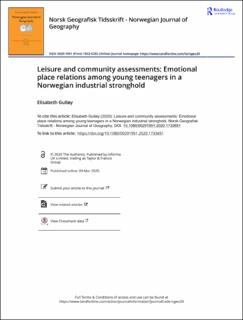Leisure and community assessments: Emotional place relations among young teenagers in a Norwegian industrial stronghold
Peer reviewed, Journal article
Published version
Permanent lenke
https://hdl.handle.net/11250/2735500Utgivelsesdato
2020Metadata
Vis full innførselSamlinger
Originalversjon
Gulløy, E. (2020). Leisure and community assessments: Emotional place relations among young teenagers in a Norwegian industrial stronghold. Norsk Geografisk Tidsskrift-Norwegian Journal of Geography, 74(1). https://doi.org/10.1080/00291951.2020.1733651Sammendrag
The purpose of the article is to explore the role of participation in organized leisure activities in young teenagers’ emotional place relations. Data from a survey of students in lower secondary schools were analysed using multivariate linear regression models to address the research questions concerning whether participation in organized leisure activities was associated with more positive community assessments in youths in line with early Nordic welfare theory and the role played by socio-economic hardships and gender in the association. The results showed that for boys there were no indications of a general positive association between participation in organized leisure activities and community assessments, while for girls the association was modest. Students who experienced socio-economic hardships had more negative assessments of community compared with well-off students, even when they participated in organized leisure activities. The author discusses the results according to a welfare theory approach to emotional place relations, supplemented by other theoretical perspectives. From a theoretical perspective, the findings point to social exclusion and inclusion dynamics instead of early Nordic welfare theory approaches to leisure participation. The author concludes that gender, class and school relations are strongly associated with young teenagers’ emotional place relations.

